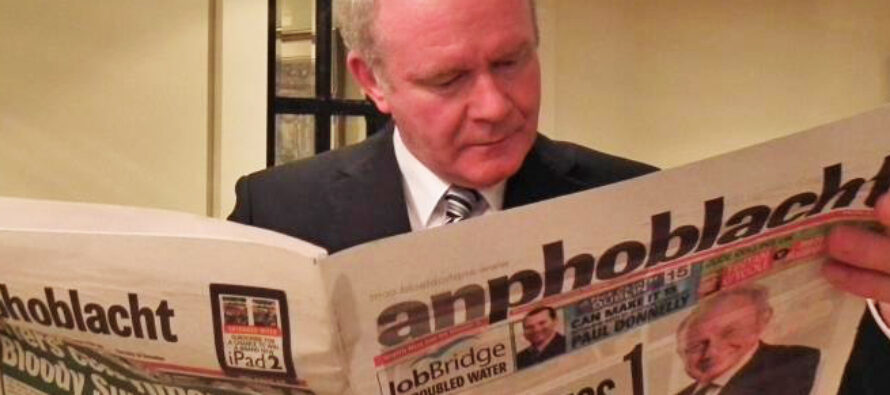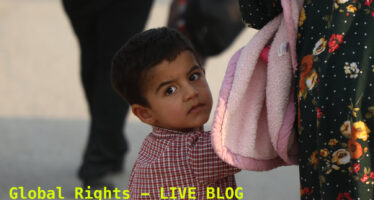Sinn Fein Martin McGuinness announces retirement

![]()
Sinn Fein’s Martin McGuinness has effectively retired from politics after announcing he will not be standing for re-election in the 2 March poll to the Belfast Assembly.
A former IRA commander, in recent decades Mr McGuinness became synonymous with Sinn Fein’s peace strategy and its efforts to achieve a reconciliation with unionism and the British establishment.
His decision to quit Stormont was announced in three television interviews this evening. It followed his resignation as deputy first minister last Monday week in protest at the latest corruption scandal to engulf his unionist partners in the Six County Executive.
That prompted this week’s collapse of the power-sharing Executive and the calling of elections for March 2nd.
In a statement, he said a deterioration in his health had coincided with the refusal of DUP leader Arlene Foster to step aside pending an investigation.
“For me to be part of an administration that was being accused of corruption.. was absolutely intolerable and under no circumstances is Sinn Fein willing to be part of an administration that is going to be continually subject to this sort of allegation, particularly when it’s coming directly at our partners in government.
“I felt I had no option whatsoever [but to resign] and it was with a very sore heart that I had to do what I had to do.”
He also revealed he had planned to step down in May this year, which would have marked the tenth anniversary since he and the late DUP leader Ian Paisley entered government together, a pairing which became famous as the “chuckle brothers”.
“Unfortunately, my health and the current crisis have overtaken this timeframe,” he said.
He was determined to overcome the rare and serious illness with which he has been diagnosed, and said he would continue to support Sinn Fein as best he could.
“Over the last 10 years I have worked tirelessly to make powersharing work,” he said. “The institutions are now in a deep crisis as a result of recent events and we are facing into an election when the people will have their say”.
Sinn Fein was a party in constant development, renewal and evolution, he said, and he felt privileged to have been a part of that. “It remains my own personal and political ambition to break the link with Britain and to unite all who share this island under the common banner of Irish men and women.
“I am deeply proud of the generation of Irish republicans that came before us. A generation that kept the vision of freedom alive through the difficult post-partition era when they faced unrelenting repression and persecution from the Ulster Unionist Party in an apartheid Orange state.
“I have been privileged to be part of the generation that broke that apartheid state apart and to have been part of a Sinn Fein leadership that delivered peace and radical change. There are more republicans today than at any time in my generation.”
Mr McGuinness said his “obvious health issues” were being addressed by a superb team of national health service doctors and nurses. “But I want to be open and honest with my friends and colleagues in Sinn Fein, with the electorate of Foyle and with the wider community beyond my own constituency. I also want to be fair to my family and to the teams of carers who are doing their best to provide me with the treatment I now require to deal with this very serious medical condition, which I am very determined to overcome,” he said.
“Unfortunately, I am not physically able to continue in my current role and have therefore decided to make way for a new leader.” Mr McGuinness said that as a Sinn Fein activist he would continue to “play a full and enthusiastic part in that essential process of building bridges, of dialogue and of reconciliation between our still divided people”.
“Despite the current difficulties and challenges, I am confident and optimistic about the future. We have faced more difficult times and found a way forward. As a society we have made enormous progress. We
must continue to move forward. Dialogue is the only option.”
Related Articles
ROJAVA RESISTANCE: DAY 10 – LIVE BLOG
![]()
19:14 The Turkish military helicopter which Turkish officials said had crashed turned out to have been downed by SDF fighters.
New legal system in Rojava
![]()
One of the most significant developments of the revolutionary struggle in Rojava has been the institution of a new system
KURDISTAN SENZA TREGUA
![]()
 Torna sulle prime pagine dei giornali il conflitto kurdo-turco. I 26 (o 24 a seconda delle fonti) militari turchi morti in una serie di attacchi simultanei sferrati dai guerriglieri del PKK contro diversi obiettivi delle forze di sicurezza nella zona di Hakkari hanno fatto gridare a una nuova recrudescenza del conflitto. In realtà la guerra non è mai cessata, le operazioni dell’esercito turco non sono mai diminuite. Anzi, da agosto si susseguono bombardamenti in tutta la zona al confine con Iraq e Iran e spesso e volentieri gli F-16 turchi sono entrati nel Kurdistan iracheno colpendo non tanto o non solo le basi del PKK (il Partito dei Lavoratori del Kurdistan) ma soprattutto villaggi facendo molte vittime civili di cui nessuno parla.
Torna sulle prime pagine dei giornali il conflitto kurdo-turco. I 26 (o 24 a seconda delle fonti) militari turchi morti in una serie di attacchi simultanei sferrati dai guerriglieri del PKK contro diversi obiettivi delle forze di sicurezza nella zona di Hakkari hanno fatto gridare a una nuova recrudescenza del conflitto. In realtà la guerra non è mai cessata, le operazioni dell’esercito turco non sono mai diminuite. Anzi, da agosto si susseguono bombardamenti in tutta la zona al confine con Iraq e Iran e spesso e volentieri gli F-16 turchi sono entrati nel Kurdistan iracheno colpendo non tanto o non solo le basi del PKK (il Partito dei Lavoratori del Kurdistan) ma soprattutto villaggi facendo molte vittime civili di cui nessuno parla.
Gli attacchi di ieri hanno suscitato reazioni molto forti, comprensibilmente. A parte il presidente della repubblica, l’islamico Abdullah Gul, che ha promesso “vendetta” e altro sangue, è stato il BDP (Partito della Pace e Democrazia), cioè il partito dei kurdi a fare la prima dichiarazione. “Basta – si legge nel comunicato – con la guerra. E’ tempo che le armi tacciano e si realizzino le condizioni per favorire la pace”. Parole che il BDP va ripetendo da anni ormai. In questo sostenuto dal PKK che (è bene ricordarlo) ha osservato un cessate il fuoco unilaterale fino al 15 giugno di quest’anno. Cioè fino a dopo le elezioni politiche che hanno visto kurdi e sinistra turca eleggere ben 36 deputati al parlamento turco. Quello che è successo dopo questo risultato serve a contestualizzare anche l’attacco di ieri, al quale i turchi hanno risposto con una nuova offensiva aerea in nord Iraq.
Uno dei 36 deputati, Hatip Dicle (in carcere), è stato privato del suo mandato per un ‘reato’ (lui che era già stato deputato con Leyla Zana e aveva già fatto 10 anni di carcere) di natura ‘terroristica’. Cinque deputati sono attualmente in carcere. Al giuramento, dopo un boicottaggio durato tre mesi e mezzo, si sono presentati in 30. Da marzo a oggi sono finiti in carcere qualcosa come ottomila tra amministratori locali kurdi, attivisti per i diritti umani, militanti del BDP con l’accusa di essere in qualche modo legati al PKK. Dal 2009 (anno della vittoria dei kurdi alle amministrative) sono sotto processo oltre quattromila politici kurdi. Dal 27 luglio il presidente del PKK Abdullah Ocalan (in carcere dal 1999 sull’isola di Imrali) non può vedere i suoi avvocati. Un divieto imposto dopo che per mesi uomini del premier Recep Tayyip Erdogan hanno incontrato il leader kurdo per concordare “protocolli di pace” poi gettati nel cassetto.


